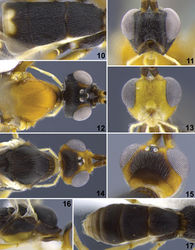Aleiodes arbitrium
| Notice: | This page is derived from the original publication listed below, whose author(s) should always be credited. Further contributors may edit and improve the content of this page and, consequently, need to be credited as well (see page history). Any assessment of factual correctness requires a careful review of the original article as well as of subsequent contributions.
If you are uncertain whether your planned contribution is correct or not, we suggest that you use the associated discussion page instead of editing the page directly. This page should be cited as follows (rationale):
Citation formats to copy and paste
BibTeX: @article{Shimbori2014ZooKeys405, RIS/ Endnote: TY - JOUR Wikipedia/ Citizendium: <ref name="Shimbori2014ZooKeys405">{{Citation See also the citation download page at the journal. |
Genus: Aleiodes
Name
Aleiodes arbitrium Townsend 2009 – Wikispecies link – Pensoft Profile
Diagnosis
Body length 5.7 mm; antenna with 43 segments; head mostly black; malar space slightly wider than basal width of mandible; ocelli small, ocell–ocular distance slightly wider than width of lateral ocellus; occipital carina at least shortly interrupted at vertex; mesosoma mostly light yellowish brown, except propodeum black; wings clear; mesopleuron granulate; apex of hind tibia without comb of flattened setae; propodeum rugulose basally, granulate apically, with median propodeal carina present; metasomal terga mostly black, except terga 2 and 3 often each with an oval-shaped off white marking; metasomal terga 1–3 costate, median carina complete to end of tergum 2; ovipositor sheaths slightly shorter than half of hind basitarsus.
Additional characters
Last flagellomere with short pointed tip; mesoscutum with carina on posterior margin only in front of scutellar sulcus; scutellar sulcus with a median carina barely complete plus two or three more or less weak and incomplete carina laterally; fore wing vein 1M slightly and evenly curved; hind wing vein 2-1A present as a very short stub, vein m-cu position varying from distinctly antefurcal to interstitial to vein r-m; ovipositor sheaths 0.45 to 0.49 times longer than hind basitarsus.
Morphological variation
All specimens examined agree well with original description of Aleiodes arbitrium, however the occipital carina in all specimens is at least shortly interrupted at vertex, and not complete but weak at vertex as described originally. The two spots on terga vary in size. In some females it is darker, not so contrasting, while in others it is larger, with the T2 spot reaching apical margin of tergite. In some males the spots tends to meet and form one single irregular elongate spot. In all specimens the gena is black–dark brown but the borders with mandibles are light brown.
Material
Type material examined. (UWIM)
Non-type material: 14 females and 9 males, ECUADOR, Napo, Yanayacu Biological Station, Napo Province, S00°35.9', W77°53.4', 2,163 m. 7 females and 6 males reared from Geometridae: ♂, YY-29185; ♀, YY-36318; ♂, YY-39980; ♂, YY-39990; ♀, YY-47187; ♀, YY-47708; ♀, YY-48161; ♂, YY-49147; ♂, YY-53729; ♂, YY-57356; ♀, YY-62371; ♀, YY-70773; ♀, YY-71345. 5 females collected by Malaise trap; 2 females and 3 males collected by yellow pan trap. (UWIM)
Biological additions
All new Aleiodes arbitrium Townsend rearings were from caterpillars feeding on polypod ferns: Diplazium costale (Dryopteridadceae) or Dennstaedtia cornuta (Dennstaedtiaceae). Most caterpillars were identified as Geometridae. Caterpillar pictures and mummy morphology corroborate family level identification, and two different species of Psaliodes Guenée (Geometridae), and one species of Pyralidae as hosts of Aleiodes arbitrium.
The holotype and eight non-type specimens were reared from Psaliodes sp. larva feeding on Diplazium costale or Dennstaedtia cornuta. The two paratypes and four other non-type specimens were reared from Psaliodes castanea (Warren) feeding on Diplazium costale. A single non-type specimen was reared from unknown Pyralidae larva on Dennstaedtia cornuta. One paratype collected from Urticaceae did not feed, so may have simply wandered there prior to mummification.
Distribution
Known only from the Yanayacu Biological Station, Napo province, ECUADOR, at 2,163 meters elevation.
Discussion
After publication of Townsend and Shaw (2009)[1] paper, 11 new specimens were reared and ten collected by traps, all from Yanayacu Biological Station, Napo Province, S00°35.9', W77°53.4', 2163. This additional reared material provided good biological information at least on feeding preferences of the host caterpillars. It is likely that Aleiodes arbitrium attacks mostly Geometridae species feeding on polypod ferns. In the circumscriptus/gastritor group, this species resembles Aleiodes albigena sp. n. in most color patterns; however, the smaller ocelli of Aleiodes arbitrium and the honey brown marks on vertex, absent in Aleiodes albigena, distinguish these two species. Other species with small ocelli and interrupted occipital carina, as Aleiodes onyx sp. n. and Aleiodes atripileatus, have more extensively dark bodies than Aleiodes arbitrium.
Taxon Treatment
- Shimbori, E; Shaw, S; 2014: Twenty-four new species of Aleiodes Wesmael from the eastern Andes of Ecuador with associated biological information (Hymenoptera, Braconidae, Rogadinae) ZooKeys, 405: 1-81. doi
Other References
- ↑ Townsend A, Shaw S (2009) Nine new species of Aleiodes Wesmael reared at Yanayacu Biological Station (Hymenoptera: Braconidae: Rogadinae) in eastern Ecuador. Journal of Insect Science 9(37): 1-22. http://insectscience.org/9.37, doi: 10.1673/031.009.3701
Images
|
